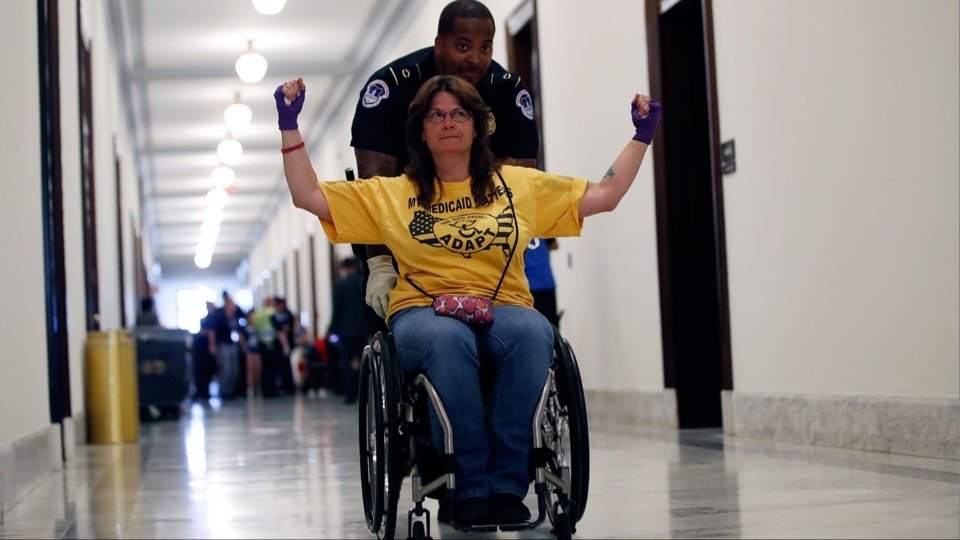BALTIMORE—In a courtroom victory for workers, families, and indeed the entire country, the cities of Chicago, Baltimore, and Columbus, Ohio, won a nationwide stay against Trump administration rules that would severely weaken the Affordable Care Act—Obamacare—by making it more expensive, harder to get, and cover less.
The Aug. 22 ruling, a stay granted by U.S. District Judge Brandon Hurson, is not a complete win for cities and their allies, though, even as officials of the three cities trumpeted it. They sought a nationwide injunction, a decision which would have completely killed off implementation of the new rules. Hurson, following a recent U.S. Supreme Court ruling banning such measures, rejected that and opted for the temporary stay—or pause—instead.
The stay, for now, directly helps 2.2 million people who, this week, under the Trump rules, would have lost health care coverage and millions more who would either be unable to get it or see it cost much more—and find it covers a lot less regardless of the cost.
The stay means President Donald Trump’s weakening “Marketing Integrity and Affordability” rules for the ACA do not take effect as he had planned. Trump and his Health and Human Services Secretary, Robert F. Kennedy Jr., intended to impose their new rules on Aug. 25. Instead, the scheme is now stalled pending a full trial on its merits.
Nevertheless, the city leaders and their pro bono lawyer coalition, Democracy Forward, rejoiced, since the judge said they’d likely win any subsequent trial on the merits. The Trump regime had no immediate reaction, but Republican hostility towards the ACA/Obamacare was expressed in 60 failed congressional attempts to kill it in the decade after its 2010 enactment.
Baltimore Mayor Brandon Scott, Columbus City Attorney Zach Klein, and Chicago Mayor Brandon Johnson hailed the stay of the Trump regime rules. So did Skye Perryman, head of the Democracy Forward lawyer team.
Making life harder for workers
“The Trump-Vance administration is making life harder for working Americans,” said Perryman. “It should be doing everything possible to increase access to affordable health care, but this administration seems intent on making accessing basic health care harder. We are pleased the court stepped in, and we will continue to pursue this case.”
Johnson was the most specific. He called the stay “truly a victory for the millions of people in Chicago and around the country that rely on the Affordable Care Act for accessible and quality healthcare.
“This ruling will continue to help our residents obtain reasonably priced health insurance and reduce the burden on our health clinics to provide free care. We will continue our efforts to ensure that all residents, no matter their zip code or income, can have access to safe, affordable, and quality healthcare,” Johnson promised.
But Christine Petrin, head of the non-profit Doctors For America, which joined the cities, warned the GOP would keep trying to kill Obamacare—just as they cut Medicaid and Medicare over the next decade through Trump’s so-called “Big Beautiful” law, to help pay for their $4.5 trillion tax cut for corporations and the wealthiest 1%.
Trump “seems determined to gut healthcare for the American people, from this destructive and illegal rule to the passage of the ‘Big, Ugly Law,’ which will force 17 million people, including small business owners, off their coverage,” Dr. Petrin said.
In his 76-page decision announcing the stay, Judge Hurson said the Trump administration did not prove it would be “irreparably hurt” if its stiffer rules for the ACA are stalled.
The judge added the cities, their lawyers, and their allies have “a strong likelihood they would succeed on the merits” of their challenges to seven of the nine ACA rules which Trump and Kennedy planned.
The seven issues the cities would likely win on include guaranteed enrollment, guaranteed health care coverage continuation, cost limits, free-to-consumers specific procedures such as physicals, and creation of the ACA’s health care exchanges to cover the uninsured.
The cities “contend the Trump-Kennedy health care [rule] contains a number of provisions that, in their individual and collective effect, will raise consumers’ premiums for plans on the exchanges, limit coverage under those plans, and deter millions of individuals from enrolling in coverage, leading to higher uncompensated care costs for providers of last resort,” the judge added.
Those losses would saddle consumers with higher costs, and cities with higher red ink for “uncompensated care”—everything from ambulance rides to surgery.
The cities and everyone else would “face irreparable harm” if their challenges failed, Hurson added. “The balance of equities and the public interest weigh in favor of a stay.”
We hope you appreciated this article. At People’s World, we believe news and information should be free and accessible to all, but we need your help. Our journalism is free of corporate influence and paywalls because we are totally reader-supported. Only you, our readers and supporters, make this possible. If you enjoy reading People’s World and the stories we bring you, please support our work by donating or becoming a monthly sustainer today. Thank you!
Award-winning journalist Mark Gruenberg is head of the Washington, D.C., bureau of People’s World. He is also the editor of the union news service Press Associates Inc. (PAI). Known for his reporting skills, sharp wit, and voluminous knowledge of history, Mark is a compassionate interviewer but tough when going after big corporations and their billionaire owners.
Oregon could become first state to adopt universal healthcare
GOP-named judges greenlight federal invasion of everyone’s privacy
Trump and RFK Jr. sneak attack underway to kill Obamacare
Judge says Trump ‘absolutely forbidden’ to deport Abrego García to Uganda
Like dictators of the past, Trump is building a private army
Trump halts big offshore wind project, killing 1,000 jobs
‘Arrogant colonial mindset’ of Trump envoy condemned in Lebanon
Labor Day 2025: More protests than parades and picnics
